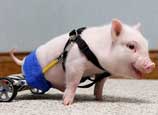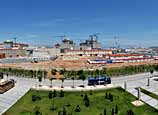
However, Lin Feng, deputy director of the mechanical and engineering department at Tsinghua University, regards the new technology more as a supplement to traditional manufacturing.
"In cases in which only a couple of pieces are needed for a finished product, the advent of 3D printing will be highly efficient and economical compared with traditional manufacturing, which requires making the mold first and then starting mass production several months later. With 3D technology, the same product can be produced immediately," said Lin.
"It may be more appropriate to call it renovation rather than revolution," said Lu Bingheng, head of the mechanical and engineering department at Xi'an Jiaotong University.
Modern manufacturing features mass production and standardization but it has faced an increasing challenge to satisfy more individual requirements from clients since the start of the 21st century. Therefore, demand for tailor-made products makes 3D printing possible, said Lu.
"Three years ago, we spent about 1 million yuan ($160,000) in developing two models to make the outer shell of a car within three months. Similar development using traditional methods requires more than one year and will cost tens of millions of yuan from making the initial model to manufacturing in bulk," said Lu.
However, Lu also noted such production cannot completely replace traditional manufacturing, especially for products that need to be made in large amounts and feature a high degree of similarity.
In the eyes of Wim Michiels, executive vice-president at Materialise NV, 3D printing is better for the environment in that there is no need to set up a full production line, which can involve a lengthy amount of time, high costs and the possible failure of the first sample due to imperfect accuracy.
"3D printing is faster and you can bring your products to the market ahead of your rivals. In addition, you have no limitations in design with this technology," Michiels said.
Although theoretically 3D printing technology can print anything from a house to a car, it needs time to test the products before they can become practical in daily life, said Lin of Tsinghua University.


















 A 9-year-old son takes good care of his amputee mother: "adults have a priority over delicious meals"
A 9-year-old son takes good care of his amputee mother: "adults have a priority over delicious meals"


![]()
